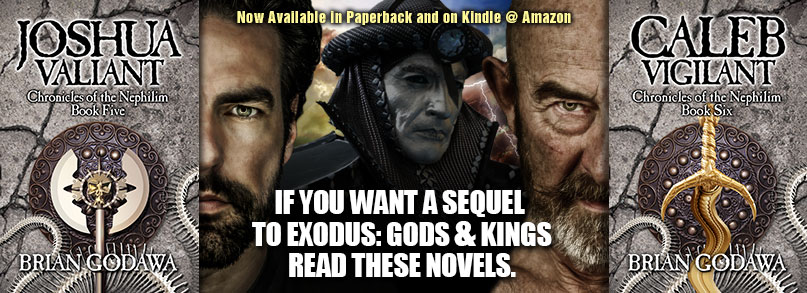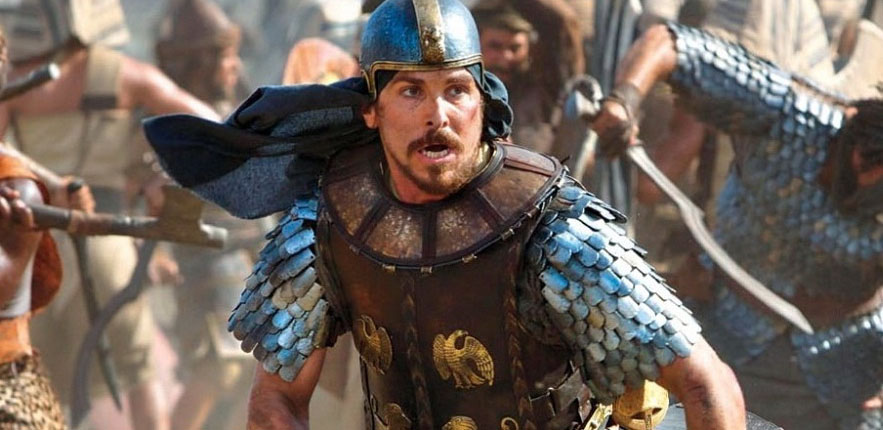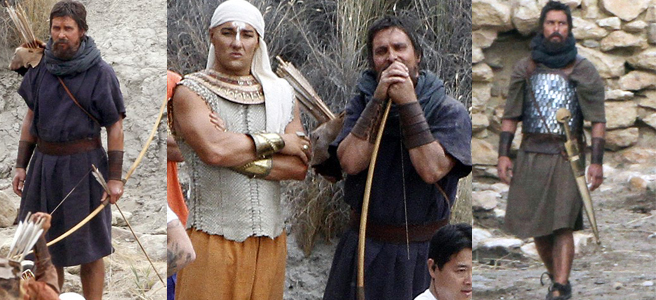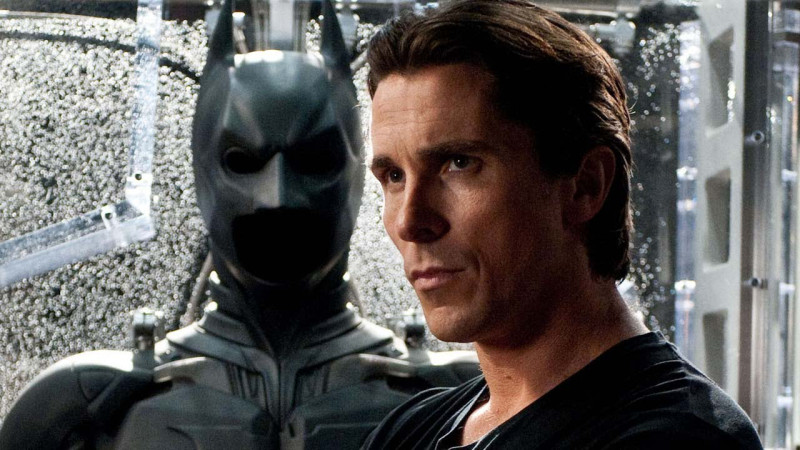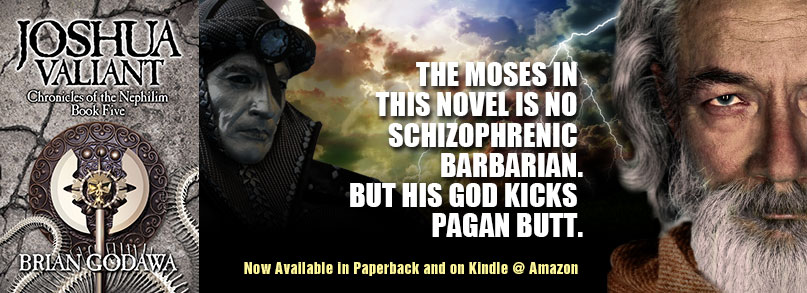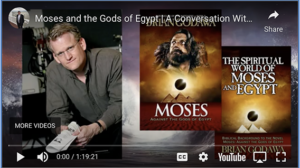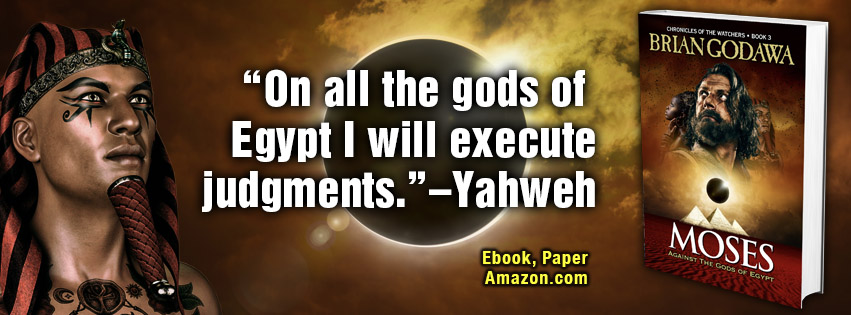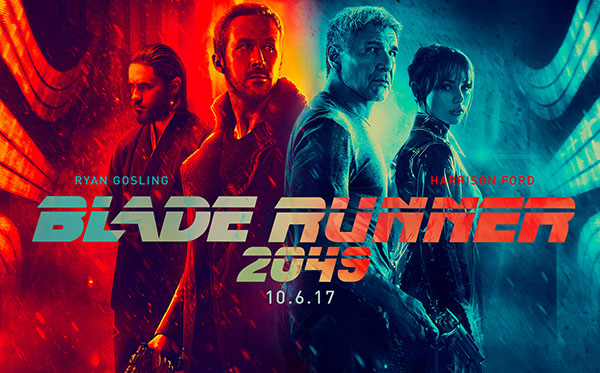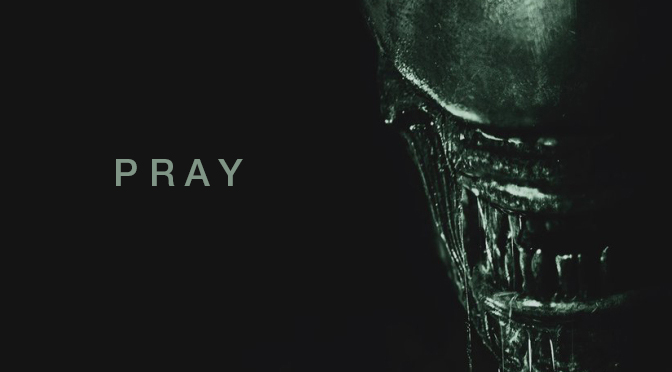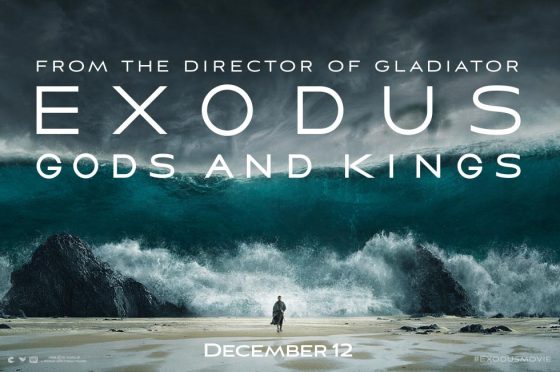
The story of Moses retold through the eyes of secular humanists, atheists and agnostics. Okay, in some ways it wasn’t as explicitly subversive as Noah, and I liked it somewhat, but it wasn’t a great movie, it was only a good movie. Is it offensive to the Biblical worldview? Yes, though I suspect some Christians will enjoy this movie, even with its failings, than they did the horribly-done and anti-Biblical Noah movie.
But in other ways, it is more explicitly subversive of God and the Bible than Noah.
For those familiar with the Biblical story, there are some moving moments of emotion such as every scene with Ben Kingsley as Nun, a patriarch of Israel. But also Moses’ final acceptance of his people. And of course, the plagues are quite spectacular.
The story opens with Moses as an adult and a general in the Egyptian army. The Bible doesn’t say what Moses was in the service of Egypt, so this is a logical choice for an action movie, and it will come into play later as a powerful display of man’s failure to achieve through his strength what only God himself can achieve in the Exodus.
We see Moses as beloved of the Emperor over his true son Commodus — Er, wait, was this Gladiator? Oh no, I mean Moses was beloved of the Pharoah over his true son Ramses. When Moses discovers who he is, and then Ramses discovers who he is, Moses is exiled.
Oh, all the details are trivial, let’s get to the plagues!
The point is, the story is about the rivalry between two men brought up almost as brothers and how their religious identities tear them apart. Pretty cool idea, but it didn’t engage me. I didn’t believe it. Joel Edgerton is much more believable than the terribly weak cuts they used of him in the trailer. But Christian Bale seems distant, even in his romance with his wife Zipporah. He is a great actor for cold, alienating or removed characters (like American Psycho) but Moses is a man of passionate extremes. This makes it hard to care much for the human drama of the story, especially his unromantic romance with Zipporah.
Could this be because Bale was trying to play his Moses as a “schizophrenic barbarian”? The Moses in this movie does struggle with faith in God, which is Biblically fair, and he becomes more ragged and crazy looking over time, but he never crosses that border into madness that is so typical of secular interpretations of prophets. So maybe that was just Bale’s own madness in his pursuit of some kind of method acting technique. A caveat here is that it’s a great technique to make a prophet appear to be mad to the populace, when he is actually right. That kind of irony is standard storytelling technique. But it wouldn’t surprise me if Scott actually does consider Moses a crazy leader, considering his portrayal of God as well.
The problem is that Bale’s Moses never really emotionally connects with anyone, not even God. But then, God isn’t very engaging either. And maybe this is where it starts to feel off. There is a lot of intimate and engaging relationship between Moses and Yahweh in the Bible, but in this story, Moses doesn’t talk much to God and he never seems to know if he is in fact talking to God, since he alone can see him.
And God appears as a temperamental ten year old child.
A word to all you Hollywood kiss-ass Christians who want to be accepted by the “cool” secular community: It is not merely “Fundamentalist Phariseeism” to critique the God of the movie. (One could even say defending Hollywood without discernment would be like Sadducees. Pharisees aren’t too fair, you see, but Sadducees are quite sad, you see). After all is said and done, God is everything. So, yes, we care how our God is portrayed.
Now we all know that you can’t put everything in the Bible in the movie and you have to make some changes for the sake of the movie story. But the problem with this god is not merely that it does not follow the relationship as depicted in the Bible, but for mere storytelling as well, it is an alienating unfulfilling relationship. Yes, Moses had his times of arguing with Yahweh in the Scriptures, but he also communed with him. In this movie, he does not. Even apart from the Biblical text, this simply isn’t a fulfilling relationship. It is cold and distant. But then again, I would expect that atheists, agnostics and secular humanist storytellers do not understand how to portray such communing relationship because they have no experience to go by. After all, they don’t even believe it exists.
The Depiction of God’s Presence
Okay, everyone knows how difficult it is to depict God’s presence in a film, and Ridley Scott has my sympathies. We all acknowledge that the Old Hollywood way of having a disembodied voice is visually less engaging. God did appear as the “Angel of Yahweh” in many instances in the Bible, so showing him as a human figure is Biblical and works (The name of the character in the credits is “Malak” which is the Hebrew word for Angel. The Angel of Yahweh in the Bible is “Malak Yahweh” in Hebrew). Scott has said he liked the idea of a child being innocent and pure. But in contrast, the child in his movie is quite precocious and temperamental, so I think he is not being entirely forthright with us. I think he is trying to sell us.
 Again, the Bible definitely shows God getting angry, so I wouldn’t complain about that. And a child is certainly a creative choice that defies expectations, which is not inherently bad either. But watching this, you can’t help but see this impetuous child as being the incarnation of what secular humanists, agnostics and atheists like Scott and the others who wrote the movie think about the Biblical God: A tantrum throwing childish deity. This is even what many village atheists have accused the Biblical God of being in an attempt to ridicule or mock him. So I think Hollywood suck-up Christians who try to accept this incarnation as “thought-provoking,” “unique,” “conversation-starting” are just fooling themselves. The atheist and agnostic secular filmmakers are deconstructing the God of the Bible.
Again, the Bible definitely shows God getting angry, so I wouldn’t complain about that. And a child is certainly a creative choice that defies expectations, which is not inherently bad either. But watching this, you can’t help but see this impetuous child as being the incarnation of what secular humanists, agnostics and atheists like Scott and the others who wrote the movie think about the Biblical God: A tantrum throwing childish deity. This is even what many village atheists have accused the Biblical God of being in an attempt to ridicule or mock him. So I think Hollywood suck-up Christians who try to accept this incarnation as “thought-provoking,” “unique,” “conversation-starting” are just fooling themselves. The atheist and agnostic secular filmmakers are deconstructing the God of the Bible.
The Naturalism of the Story
Scott has indicated he doesn’t believe in the miracles of the Bible and wanted to depict them with some naturalistic explanations. Well, I’m going to surprise you here, but I am not entirely against depicting miracles in a way that they can be disbelieved. After all, this is exactly what happened. The Israelites would see such things and then slip right back into worshipping Ba’al or Asherah. The Egyptians and Pharaoh did not repent. The Jewish leaders concocted a theory that the disciples stole the body of the resurrected Jesus. I like the idea of showing miracles in a way that unbelievers can justify their foolishness. To be fair to Scott, during the plagues, he shows the “scientists” of Pharaoh’s court giving their pompous natural explanations for what was happening. And they clearly looked foolish, so that supported the miraculous nature of the plagues.
But here is where the story becomes confusing. Scott withdraws God so much from the story that he never communicates anything to us. The plagues just occur, one after the other without any introduction or explanation from God or Moses to anyone. To be quite frank, I would think that unless you are familiar with the story, you wouldn’t really know what was going on. And nowadays I do not think it is correct to assume that everyone knows the story. In the Bible of course, Yahweh announces through Moses each step what he is doing and why. He makes it clear. Okay, some artistic ambiguity is fine, but one can clearly see Scott’s intent is to strip God out of the picture as much as he can get away with. To make the story as human as possible. Remember, Scott does not believe Yahweh is real anyway, so he is just a metaphor for some other interpretation of human need. The more human, the less God, the better.
As a side note, the ultimate love in this story is the love that ends the picture and is a repetitive series of sayings between Moses and his wife Zipporah. “Who makes you happy? (you do). What is the most important thing in your life? (you are). When will I leave you? (never).” On a human level, these are understandable expressions of love between husband and wife. But it points out the idolatry of all humanistic stories like this. In all secular stories, the ultimate love relationship that gives meaning to life is NOT a love relationship with God, but with another human being. Again, this is understandable coming from a humanistic storyteller, that human love would become a God replacement because after all, that is the highest kind of love that they know. What secularists do not understand is that all those sayings above are what believers say of God. God is our joy, God is the most important thing in our life, and God will never leave us or forsake us. Just a little deconstruction of atheist, agnostic and secular idolatry for you.
Back to the miracles. Here is where I may surprise you. I actually liked the parting of the Red Sea as a tsunami (and the crocodile attacks turning the river to blood). It doesn’t make it less of a miracle. Kinda coincidental timing, don’t ya think? And so what if it gives unbelievers a chance to reject it. They wouldn’t believe if someone returned from the dead anyway. Now, I am not a theologian, but the term used for “dividing” the Sea in Hebrew means “to cleave, break open or break through,” (BDB lexicon), all of which can be literary or poetic expressions of what happened with that tsunami. The way the Sea was parted in the classic The Ten Commandments was just as much an interpretation and no more Biblical.
The problem with it is the same problem throughout the story. In the Bible God announces what he is going to do and challenges Moses to step out in faith and do things like pronounce the Nile will turn to blood, or in this case, hold out his staff and the waters would part. In the movie, Moses throws his sword into the water in anger that God has left them to die. Then he wakes up to see the sword sticking in the mud with the waters pulled back. So, every step is surprising to Moses. Sure, God surprises us, but I can see how Scott and his agnostic, atheist and secular storytellers want God to be unclear so that it all comes down to interpretation. In a way, it seems like making this movie for them is like the unbeliever explaining away all the miracles just like the Egyptian “scientists.”
Update: Interestingly, the most important miracle of all is the Ten Commandments written by the very “finger of God.” In the film, Moses is the one carving the tablets, not God, thus again, reducing the very foundation of morality to man’s creation, not God’s. This is far more important than you may know. What atheists, agnostics and other seculars and humanists do not realize is that without God as the foundation of morality, there is no authority above man’s arbitrary will to power. The one with the most power determines right and wrong. Period. Blather all you want about your subjective feelings, social contracts or even natural selection of morals, at the end of it all, there is no objectively real right and wrong, there is only personal feelings in conflict — the will to power.
But I deconstruct again.
The Politics of the Movie
All period pieces are stories of the past retold in light of our present situation. We tend to see through our eyes, but also seek to make lessons for the present out of the past. And movies do not exist in a vacuum. They often reflect the zeitgeist of an era. Thus the Noah movie becomes an environmentalist parable.
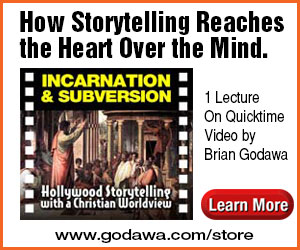 So, Exodus is infected by modern Hollywood leftist anti-Israel politics. In the Bible, Moses never uses force or violence against the Egyptians. The point is to show that Yahweh is the one who delivers, not horses and chariots or man’s strength. The movie makes a similar point, but through a different path. When the movie Moses thinks he is to deliver his people, since that annoyingly precocious and distant God doesn’t explain himself, Moses concludes that he can do the only thing you can do when you are an oppressed minority: terrorist guerilla tactics of hit and run “bombings.” And God is portrayed as accepting it, and only deciding to take over with his plagues when he concludes it will take too long for terrorist tactics to work (“Maybe a generation”). So God is a revolutionary Marxist here. Or at least an Alinskyite. Oppressed workers of the World, unite and rise up! (The conquest of Canaan is a different story with a very different justification that doesn’t apply to this story).
So, Exodus is infected by modern Hollywood leftist anti-Israel politics. In the Bible, Moses never uses force or violence against the Egyptians. The point is to show that Yahweh is the one who delivers, not horses and chariots or man’s strength. The movie makes a similar point, but through a different path. When the movie Moses thinks he is to deliver his people, since that annoyingly precocious and distant God doesn’t explain himself, Moses concludes that he can do the only thing you can do when you are an oppressed minority: terrorist guerilla tactics of hit and run “bombings.” And God is portrayed as accepting it, and only deciding to take over with his plagues when he concludes it will take too long for terrorist tactics to work (“Maybe a generation”). So God is a revolutionary Marxist here. Or at least an Alinskyite. Oppressed workers of the World, unite and rise up! (The conquest of Canaan is a different story with a very different justification that doesn’t apply to this story).
Do you see where this is leading? Ah yes, the Jews, were terrorists themselves. The connection to today is obvious. The dominant media and most of Hollywood are Israel haters who claim Israel is the oppressor today, when they are the ones who are being attacked. Some even claim Israel is doing to the Palestinians what the Nazis did to them (As some professors at Oxford have claimed in a recent debate with Dennis Prager). This of course is a monstrous lie. The Palestinians, who are actually Nazi-like in their ideology (dedicated to genocide) have been able to spin the liberal media and entertainment so that the Nazis are accusing their victims of being Nazis. Reprehensible. Insane. Evil. But fashionable in Hollywood. And truly postmodern. What next, accuse the Jews of being genocidal as Islamic regimes like Iran engage in genocide against them?
This is why I cannot help but have a little bit of schadenfreude when I see Scott having to squirm against the accusations of racism because his casting was white for all the leads. It’s nice to see that leftist political correctness come back on liberals. Liberals must eventually become victims of their own oppressive politics. Sweet. I would think this would show Scott that maybe he should not be part of that liberal insanity. Of course, Scott is actually in the right, on this one. It is the world market (and the money is based on the world) that wants those white people as leads. The world that is full of all kinds of non-white people will not pay for movies unless they have those evil white crackers in the lead. So, really, by liberal standards, if you are against casting Exodus to please a world of multicolored people, then YOU are the racist.
Bottom Line: Gimme Some Truth
One cannot help but compare it to the classic The Ten Commandments with Charlton Heston. Yes, that movie didn’t follow the Bible perfectly. Yes, it has flaws of its own, and this is a different new and modern take with a different audience with different needs and desires. But if you can just put aside all the modernist prejudice against the old classic, if you can hold off the elitist snobbery accusations of corniness, if you can suspend your modern intolerance of lesser acting and production quality of older movies, you can see something that made that old movie the massive beloved classic it is. And that something is what seems to lack in this slick special effects, cold, distant and modern version of Moses: heart and soul.
I have read liberal scholarship on King David. I know the fashionable subversion of writers like Halpern who seek to deconstruct David as a serial killer terrorist who did the opposite of everything the Bible says he did. For God’s sake, Liberal Hollywood, please DO NOT make a King David movie. Instead, I dare you to make a movie about the Islamic god, Allah, like you do about the Biblical God Yahweh. Oh no, wait, you won’t DO THAT, because THAT would get you murdered. Yahweh, Christians and Jews are safer targets for bigotry and hate speech.
One of the powerful moments of truth came from Pharaoh’s words, “Men who crave power are best fit to acquire it, and least fit to exercise it.” Maybe that’s true of Bible movies as well.
If you want an engaging and entertaining sequel to Exodus: Gods and Kings, then buy the novels, Joshua Valiant and Caleb Vigilant from the series Chronicles of the Nephilim. They will give you back that heart and soul with a love for the Biblical God so often vacant from Hollywood Biblical movies.
